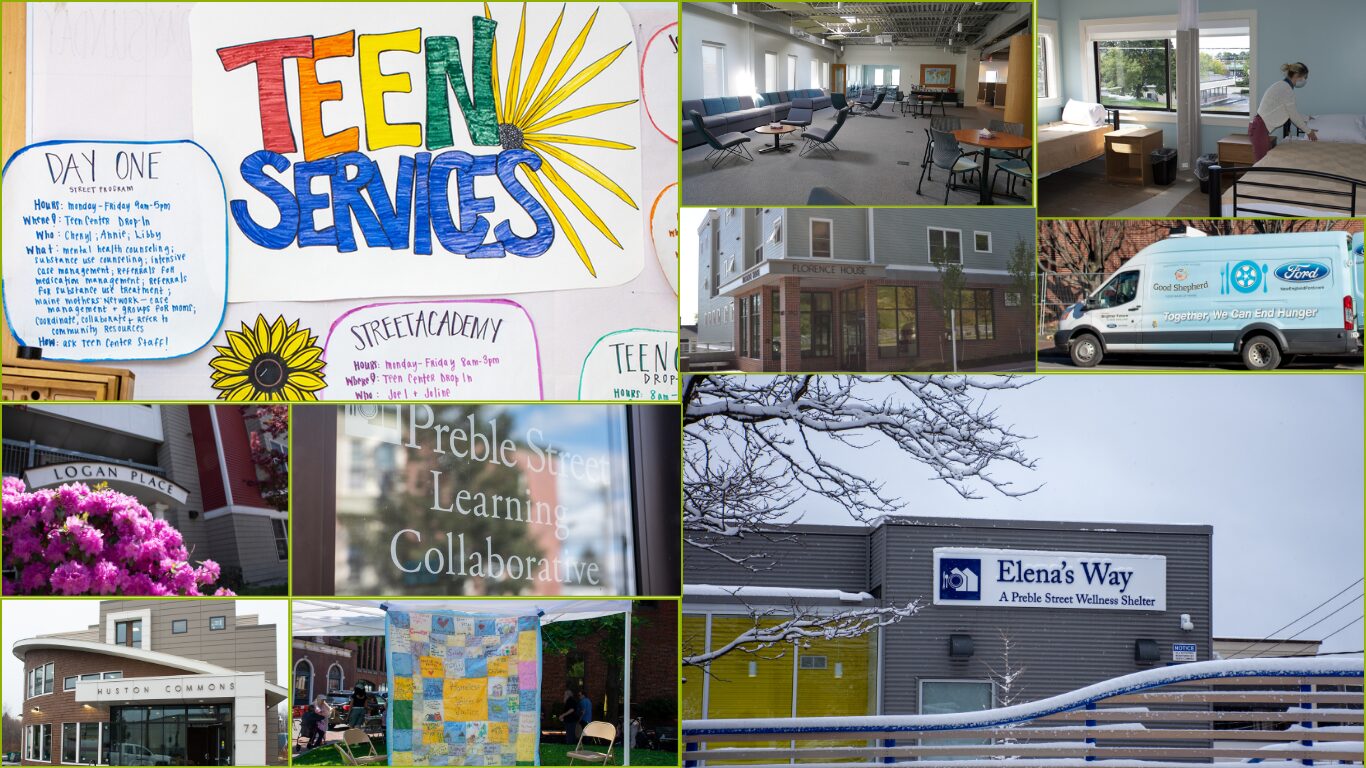“I am a human being. Part of my job, part of being alive, is making sure others are, too.”
Joe Kreisler, Preble Street Founder
Every ten days, a client at one of Preble Street’s programs experiences an overdose. Preble Street staff respond to these overdoses, reversing as many as possible, saving lives, and compassionately utilizing their professional expertise on the front lines of this public health crisis. Living in high stress situations, with limited access to healthcare, makes people experiencing homelessness particularly vulnerable to both opioid use disorder and opioid overdoses. Practicing harm reduction, establishing positive relationships, and creating open lines of communications with people is key to preventing and addressing overdoses.
Britt La Shier, Director of Preble Street’s Recuperative Care program, shares that honest, nonjudgemental conversations are a key part of harm reduction and social work: “We love having honest and open conversations with people… we’re constantly asking those questions of ‘what does your use look like?'”
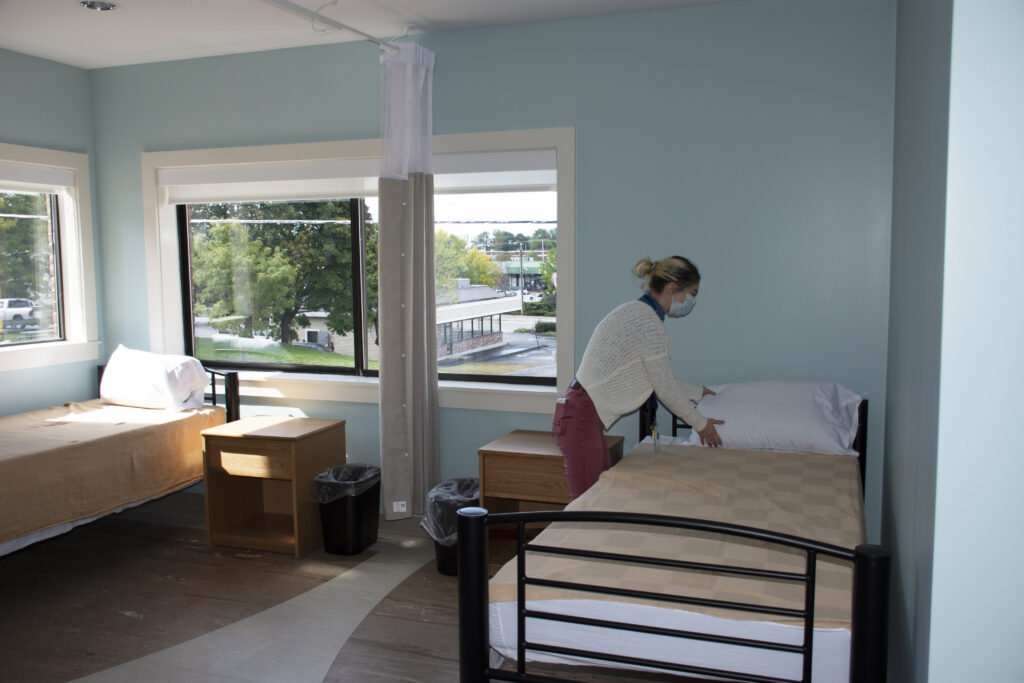
Britt preparing a bed for a client.
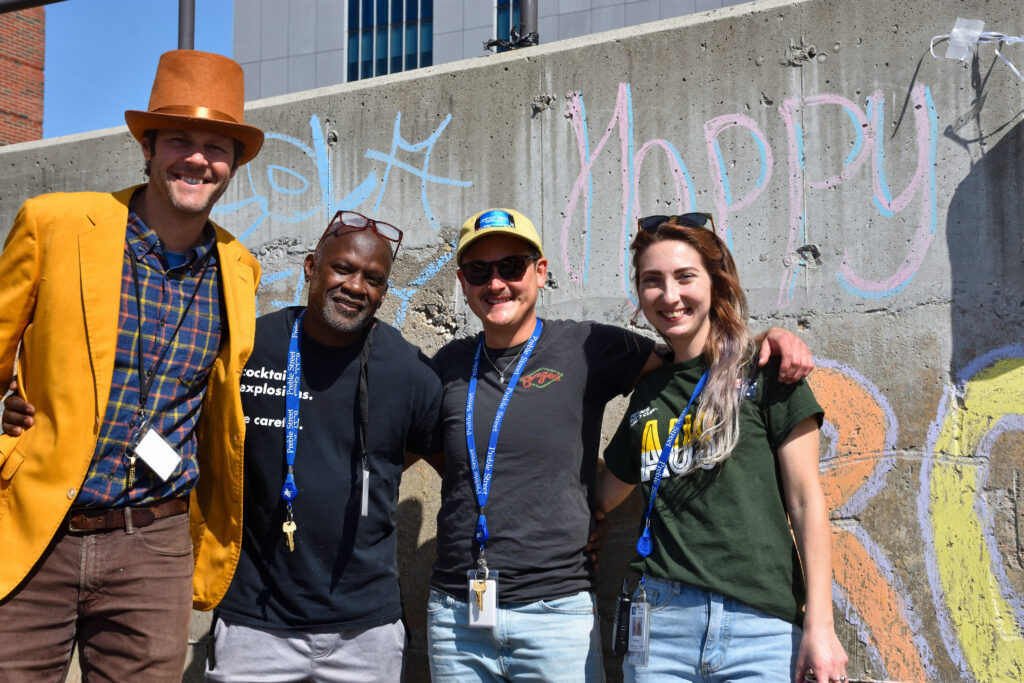
Staff celebrating the 1-year anniversary of Maine’s first recuperative care program.
Recuperative care (also known as medical respite care) refers to short-term medical care and case management for individuals recovering from an acute illness or injury that generally does not require hospitalization but would be worsened by their living conditions (e.g., street, shelter, or other unsuitable places).
This innovative program, a partnership between MaineHealth, Greater Portland Health, and Preble Street, fills this need for many people experiencing homelessness, who are recovering from a surgery or a procedure after a hospital stay.
La Shier outlines some of the many ways staff and medical providers engage in harm reduction to minimize the harmful impacts of chronic drug use and save lives. Through Preble Street, patients have access to safe supplies, and Greater Portland Health can prescribe medication on-site, like buprenorphine or naloxone, to treat opiate dependence. Importantly, staff also have open and honest conversations with clients about their use and recovery. La Shier shares, “That’s one of the ways that we really hone in on harm reduction… always having conversations about where [clients] are at.” La Shier also explains that “it takes a lot of time, and it’s not just medication that’s going to solve someone’s substance use disorder.”
Watch this story NewsCenter Maine about the CONNECT Van.
On Monday, July 1, the CONNECT (Community Outreach Network Navigation Evidence-Based Care and Treatment) van will be hitting the road. The CONNECT van is a mobile health and harm reduction program, delivering low-barrier, trauma-informed care to people experiencing and at risk of homelessness in Greater Portland. It’s an extension of the Maine Health-Preble Street Learning Collaborative, reaching patients with untreated psychiatric and substance use disorders. CONNECT meets patients on the street, in encampments and shelters, and in transition from inpatient and carceral settings to deliver care when and where needed.
Harm reduction is also critically important for Elena’s Way Wellness Shelter, one of Maine’s five privately operated low-barrier shelters, which provides shelter to individuals with complicated mental health and substance use disorders. Elena’s Way, and Maine’s other low-barrier shelters, are on the frontlines of the opioid crisis. They aim to ensure that individuals who may be actively using drugs, can access a safe and consistent shelter environment. Harm reduction practices, like safe supplies, Narcan, and honest conversations about use and recovery, are crucial to the success and well-being of patients in these environments and save lives.
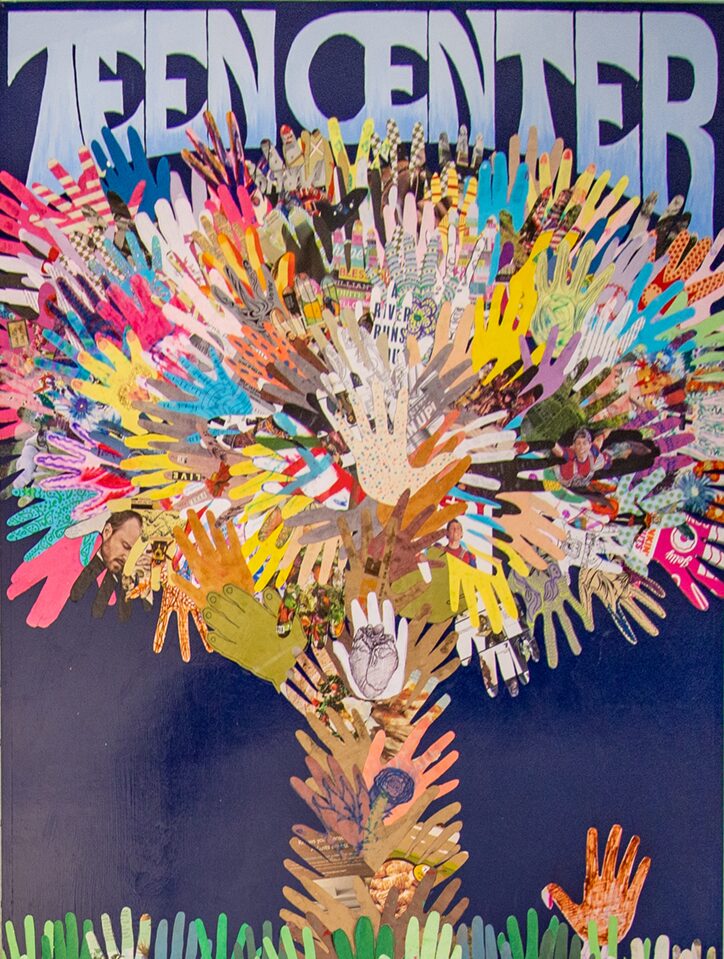
At Preble Street’s Teen Center, harm reduction can look like an honest conversation with a young person about drug use and its harmful impacts. Celine Guedj is the McKinney-Vento Outreach Specialist at the Teen Center. She shares that the number one priority of staff at the Teen Center is the safety and well-being of youth. Honest, nonjudgemental conversations about drug use foster strong relationships with youth and enable staff to provide the safest space possible at the Teen Center for young people. “People can’t possess drugs, and they can’t use drugs in the space, but once they learn that they won’t be judged or punished for their drug use outside of the Teen Center, then it opens up a line of communication for them to talk to us about what substances they are using, which leads to safer outcomes,” shares Guedj.
“Harm reduction is a humanizing force. Not only does it build better relationships or lead to better outcomes or keep people safe, but it also honors the humanity and the autonomy of young people, who are often denied agency or choice and sometimes not even believed.”
Celine Guedj, McKinney-Vento Outreach Specialist
Using those lines of communication, Guedj and other Teen Center staff educate youth on the harmful impacts of drug use, present young people with ways to reduce harm, and promote a safe, welcoming, and inclusive environment at the Teen Center. This can include educating youth about the negative health effects of drug use, including even the impacts of cannabis on a developing brain.
Both La Shier and Guedj agree that harm reduction saves lives, leads to better outcomes, and respects the choice of the people they serve…
Practicing harm reduction... people feel truly seen and positively regarded and are able to get the help that they're seeking.
Celine Guegj
Harm reduction tactics save lives for lots of reasons. We're creating a community. When we isolate people, we create unsafe environments, stigmatize people, and encourage them to use alone, which leads to many of the harmful effects associated with chronic drug use.
Britt La Shier
Harm reduction can look different for different people, but accepting the reality of drug use, and working to minimize its harmful impacts with proven harm reduction practices and tactics, like safe supplies, overdose reversals, and community-building, leads to better outcomes and saved lives.
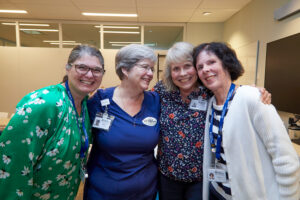
Compassionate end-of-life care for unhoused individuals
Preble Street’s work is never done in isolation. We are continuously making connections with other social service providers and nonprofits to better serve clients and the needs of the community. This month, we are highlighting a special partner of several of our programs, Hospice of Southern Maine. Hospice of Southern Maine (HSM) works to ensure
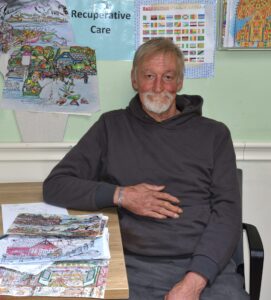
Brian’s Story
Sitting at a table at the Recuperative Care Program (RCP), Brian lays out pages of his art. “I’m working on making a children’s coloring book,” he says. Most of the pieces he has laid out are of captivating coastal scenes featuring birds, boats, and buoys. The longer you look at each page, the more you’ll
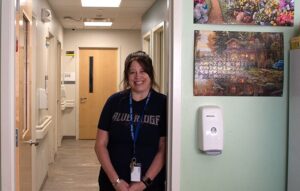
Staff Highlight: Caitlin Tobin – “I learn so much from our clients”
Preble Street staff are #CompassionInAction, and we want you to get to know them! This month we’re introducing you to Caitlin Tobin, 1st Shift Case Manager at the Recuperative Care Program. Name, title, and program: Cait Tobin, Case Manager, Recuperative Care Program (RCP) How long have you worked at Preble Street? I’ve been here for
